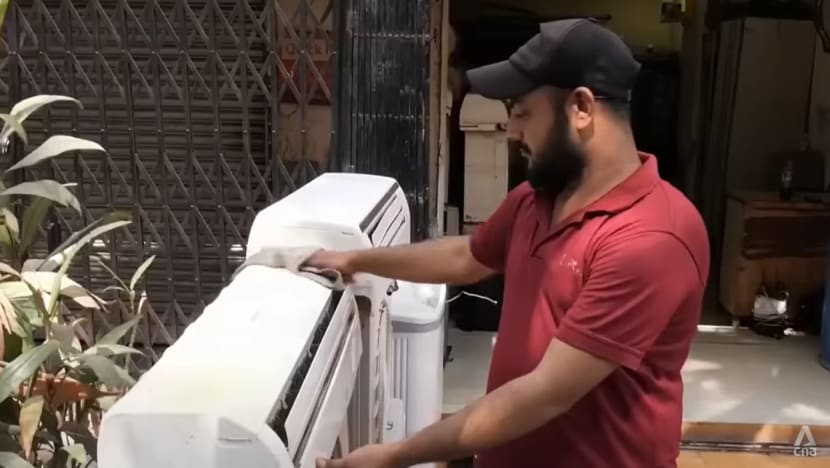As India braces for surge in heatwave days, demand rises for air-conditioners
The world’s most populous country will have more than 1 billion air-conditioning units in operation by 2050, according to the International Energy Agency.

Rakshith Kotian, owner of Ahmed Cool Point in New Delhi, cleaning air-conditioners on sale.

This audio is generated by an AI tool.
NEW DELHI: Sheetal Kumari and her family used to go without an air conditioner until their home became unbearable during the summer months, when the average maximum temperature soars to nearly 40 degrees Celsius.
The 21-year-old student lives in an urban slum on the outskirts of New Delhi, where homes are often built hastily in narrow spaces without proper ventilation.
For them, the summer heat is more than an inconvenience – it is a health threat.
“My sister had to be hospitalised because of how dangerous the heat was. After that episode, we decided to get an air conditioner,” she told CNA.
The family now rents two air-conditioners for about US$350 for three months in the summer. Sheetal said it saves them money as buying one would have cost them double, with added cleaning and maintenance costs.
But staying cool comes at a cost.
The air conditioners have driven up their power bill – a big drain on their limited finances.
“We've cut back on other expenses and are buying fewer groceries,” Sheetal said.
India is bracing for a potential doubling of the number of heatwave days this year, despite recent thunderstorms bringing some respite.
This has driven the world’s most populous country to become the fastest-growing market for air conditioners globally.
The International Energy Agency has projected that India will have more than 1 billion air-conditioning units in operation by 2050.
Summers across the Indian subcontinent are becoming hotter and more humid, with little cooling at night. An estimated 80 per cent of India’s population is vulnerable to the impact of heatwaves, which now pose increasing risks to public health and safety.
This growing demand is boosting business for air-conditioner rental shops like Rakshith Kotian’s in Mumbai, who supplies cooling units to daily wage labourers and factory workers.
He said he has never been busier.
“The three summer months are my busiest,” he added. “My earnings during this time carry me through the rest of the year.”
ENVIRONMENTAL CONSEQUENCES
But the growing reliance on air conditioning comes with environmental consequences.
These units push hot air outside, contributing to the “urban heat island” effect that makes cities even warmer than surrounding rural areas.
On top of that, powering these cooling systems largely depends on fossil fuels. Coal, which already accounts for 55 per cent of India’s energy mix, must be burned in greater quantities to keep up with soaring electricity demand.
During the April to June 2024 heatwave, air-conditioning usage surged by 10.4 per cent compared to the same period the year before, according to global energy think tank Ember.
Experts have warned that this creates a vicious cycle: Hotter days increase the need for cooling, which in turn burns more fossil fuels, releasing emissions that worsen the crisis.
Architect and urban designer Adarsha Kapoor believes the key lies in reducing reliance on air-conditioning through smarter building design.
“The building construction and building maintenance techniques have to be such that the internal heat is reduced,” he noted.
“The walls (in India’s buildings) are generally thicker. You have walls which can reflect heat rather than retaining heat inside.”
He suggested having “green roofs” and walls painted with lighter colours that can reflect sunlight.
Yet such solutions remain out of reach for families like Sheetal’s.
For now, the only escape from the relentless heat lies in air-conditioners - as long as they can afford to keep them running.
















